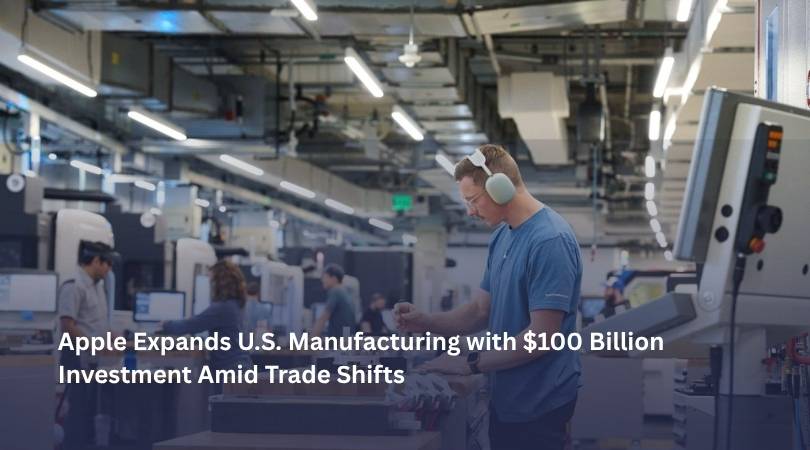07 August 2025, United States
Apple Inc. announced a historic $100 billion boost to U.S. manufacturing, a move that strategically aligns with the transforming global trade landscape while additionally expanding the company’s domestic footprint. Along with the announcement, President Trump announced a 100% tariff on imported semiconductors, with exceptions for companies that invest in domestic manufacturing. This dual development indicates the larger trend of supply chain localisation and represents a significant turning point for the American technology manufacturing ecosystem.
The Trade Policy Backdrop
President Donald Trump announced that the US would impose a tariff of around 100% on semiconductor imports, but he also offered a significant exception it wouldn’t be applicable to companies that are already manufacturing in the US or have pledged to do so.
Apple’s action is an obvious response to these changes in policy. In addition to securing tariff exemptions, Apple is positioning itself to gain political and strategic favour by committing an additional $100 billion to U.S. manufacturing, increasing its total U.S. commitment to $600 billion. It is anticipated that the investment will contribute to a number of domestic projects, such as the development of the U.S. silicon supply chain and the production of advanced components.
Investment Scope and Focus Areas
Apple American Manufacturing Program
Apple launched the American Manufacturing Program (AMP) in order to strategically increase its advanced manufacturing footprint and U.S. supply chain. This program indicates a significant increase in domestic investment, expanding Apple’s commitment to the U.S. by $100 billion over the next four years to $600 billion.
100% U.S.-Made Cover Glass for iPhone & Apple Watch
Apple is investing $2.5 billion in a partnership with Corning in Harrodsburg, Kentucky, as part of the AMP. The facility will be able to manufacture all of the cover glass for iPhone and Apple Watch units worldwide due to this funding. In addition to a 50% increase in employees, the facility will house the most advanced smartphone glass production line in the world and a new Apple Corning Innovation Centre to advance materials engineering.
Expanded Production of Critical Components
Apple’s AMP expands production in the United States to include additional essential components, such as:
- Laser modules for features such as Face ID
- A $500 million agreement with MP Materials supports rare earth magnets.
- Semiconductor chips produced by American partners such as Broadcom, Texas Instruments, GlobalFoundries, Samsung, TSMC, and Applied Materials
Geographically Diversified Investment
AMP offers investments in several U.S. states, including:
Along with thousands of suppliers and partners, Arizona, California, Iowa, Kentucky, Nevada, New York, North Carolina, Oregon, Texas, and Utah support over 450,000 jobs across the country.
New U.S. Hiring and R&D Expansion
Over the next four years, Apple plans to directly hire 20,000 employees for positions focused on software development, R&D, silicon engineering, and AI/machine learning.
|
Area |
Description |
|
AMP Launch |
$100B boost in U.S. investment; total commitment now $600B. |
|
Glass Manufacturing |
$2.5B to make all iPhone/Watch glass in Kentucky; new innovation center. |
|
Key Component Production |
Scaling production of lasers, magnets, and chips via U.S. partners. |
|
National Reach |
Investment across 10 states, leveraging 450,000+ supplier jobs. |
|
Talent & R&D Growth |
Hiring 20,000 directly in R&D, silicon, AI, and software. |
In addition to improving Apple’s operational capabilities, these investments support national objectives related to job creation, economic security, and technological independence.
Market and Shareholder Reaction
Apple’s stock encountered immediate and favourable reaction to the announcement. Following the announcement, shares increased by about 5% as investors witnessed the investment as an established hedge against growing trade risks. Apple’s action may also help protect its iPhones and other devices from price increases brought on by the semiconductor tariffs.
Interestingly, the positive ripple effect extended beyond Apple. Stocks of companies such as Samsung, SK Hynix, and TSMC that have or intend to expand their manufacturing in the United States also rose. The response of the market demonstrates the widespread perception among investors that companies operating domestically are more resistant to protectionist policies.
Implications for the U.S. Manufacturing Sector
Apple’s $100 billion commitment is a spark for a larger American manufacturing revival rather than merely a change in corporate strategy. Due to supply chain maturity and cost advantages, tech manufacturing has historically been concentrated in Asia; therefore, Apple’s investment might persuade other businesses to reevaluate their global production strategies.
Furthermore, the action is projected to provide thousands of highly skilled jobs in several states. A more robust and vertically integrated supply chain in the US could be developed by Apple by investing in domestic production of essential components, lowering vulnerability to outside shocks such as pandemics or geopolitical conflicts.
Apple Builds End-to-End Silicon Supply Chain in the U.S.
In the United States, Apple is leading the endeavour to establish a completely domestic, end-to-end silicon supply chain. The company is at the forefront of technological self-reliance with this initiative, which also directly addresses rising trade volatility and semiconductor nationalism.
Scope and Scale
- It is anticipated that this supply chain will produce over 19 billion chips in 2025, mostly for iPhone and iPad devices.
- Advanced logic chips, connectivity elements, and power-efficient semiconductors foundational technologies in Apple’s product ecosystem are all part of this endeavour.
Key Strategic Partnerships and Nodes
|
Stage |
Partner |
Location |
Function |
|
Wafers |
Global Wafers America |
Sherman, TX |
Producing 300mm advanced silicon wafers from U.S. sources |
|
Raw Silicon |
Hemlock Semiconductor (Corning) |
MI |
Source of silicon for wafer production |
|
Fabrication |
TSMC |
Phoenix, AZ |
Producing tens of millions of advanced chips; Apple is anchoring customer |
|
|
Texas Instruments |
Lehi, UT & Sherman, TX |
Fabrication using advanced process nodes |
|
|
Samsung |
Austin, TX |
Launching a first-ever chip manufacturing technology |
|
|
GlobalFoundries |
Malta, NY |
Wireless & power management chips |
|
Packaging |
Amkor |
Arizona |
Advanced chip packaging and testing; serving TSMC fab chips |
|
Equipment |
Applied Materials |
Austin, TX |
Manufacturing semiconductor production tools |
|
Modules |
Broadcom & GlobalFoundries |
U.S. |
Cellular semiconductor components for 5G & connectivity |
Apple Expands Strategic Footprint with New U.S. Facilities and Manufacturing Hubs
Key Facility Developments
|
Facility |
Location |
Function |
Timeline |
|
Advanced Server Factory |
Houston, Texas |
Producing servers for Apple Intelligence & Private Cloud Compute |
Mass production begins 2026 |
|
Apple Manufacturing Academy |
Detroit, Michigan |
Training small & medium manufacturers in AI and advanced manufacturing |
Opens August 19, 2025 |
|
Data Center Expansion |
Maiden, North Carolina |
Supporting services such as iCloud, Apple TV+, iMessage, and Apple Intelligence |
Ongoing; part of $5B+ investment |
|
New Data Center Builds |
Iowa, Nevada, Oregon |
Nationwide expansion to support service scalability & Apple Intelligence |
Under construction |
|
Second Austin Campus |
Austin, Texas |
Home to 3 R&D buildings and over 13,000 employees |
First phase complete, second phase underway |
Thus, Apple has strategically responded to changing trade policies and rising semiconductor tariffs by investing $100 billion in U.S. manufacturing expansion. Apple strengthens supply chain resilience and gains policy advantages by increasing domestic production, R&D, and AI capabilities. By making this move, Apple establishes a standard for future tech manufacturing in America and positions itself as a leader in reshoring.











